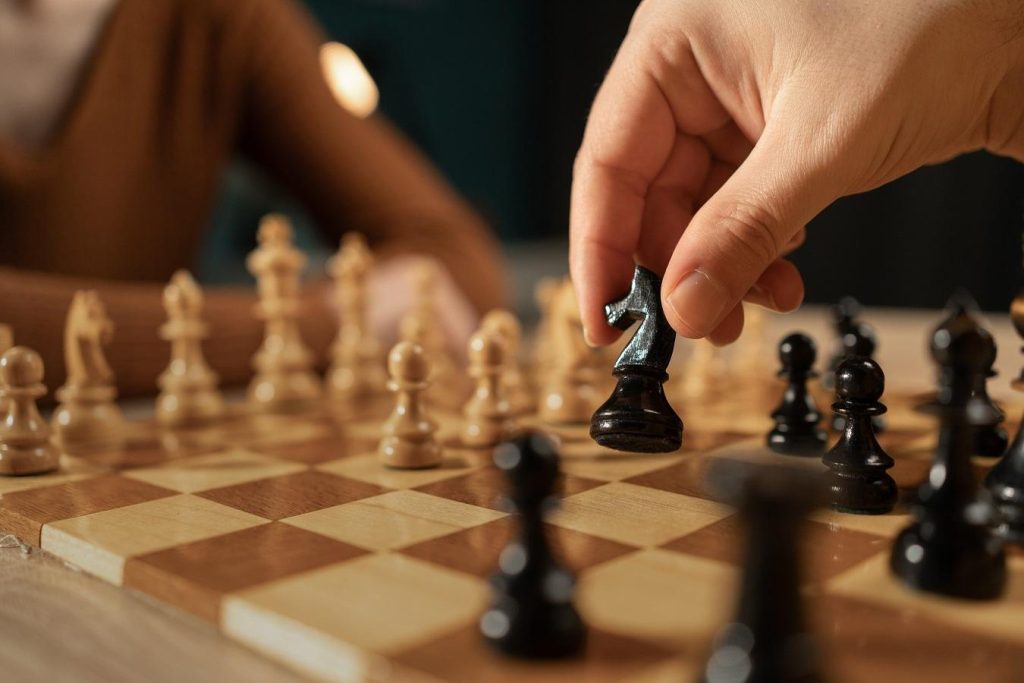Chess Blunders: Why Players Throw Away Winning Positions
Sep 23rd, 2025
There is a saying that echoes in every tournament hall: “The hardest game to win is the one that’s already won.”
At first, it sounds puzzling. After all, once a player has the advantage, the rest should be simple — right? But anyone who has played chess knows the truth: winning positions are delicate, and many victories have dissolved into draws or even defeats.
Why does this happen so often? Why is it that players falter not in the struggle to gain an advantage, but in the act of converting it? The answer lies in the fascinating blend of psychology, strategy, and discipline that defines chess.
- The Psychological Traps of Winning Positions

A position of strength is not just a test of skill — it’s a test of the mind.
Overconfidence
Once ahead, players often breathe a sigh of relief. The intensity fades, and calculation becomes sloppy. The brain shifts from “hunting for victory” to “expecting victory.” This subtle change is dangerous, because chess punishes even a moment of carelessness.
Excessive Caution
The opposite problem is equally common. With a winning position in hand, players suddenly become afraid of making any mistake. The desire to protect the advantage makes them passive. Instead of finishing off the game, they hand over the initiative to their opponent.
Time Pressure
Many victories are lost on the clock, not on the board. Players often burn precious minutes searching for the most “beautiful” or “cleanest” win. When the time finally runs out, panic sets in and accuracy disappears.
Emotional Tilt
Making one mistake in a balanced game is frustrating. But making a slip in a winning position feels devastating. That emotional shock often leads to further errors, turning an almost certain win into a painful collapse.
Psychology, more than calculation, is often the first enemy of conversion.
- Strategic and Technical Missteps

Even with nerves of steel, strategy can betray the player who forgets the fundamentals.
Imprecision in Calculation
A common error is assuming intuition is enough once the advantage is secured. But winning often requires more accuracy, not less. One careless move can open doors that should have remained closed.
Ignoring Counterplay
A winning position does not mean the opponent has no ideas. Too many players dismiss small threats until they snowball into game-changing opportunities. Respecting the opponent’s resources is essential, even when miles ahead.
Piece Coordination
A material edge means little if the pieces do not work together. Misplaced rooks, passive bishops, or isolated queens can turn a dominant position into chaos. Chess is about harmony, and even in victory, coordination matters.
Endgame Challenges
The endgame is where many victories die. Rook endings, in particular, are notorious for being “drawn despite advantage.” Stalemates, perpetual checks, and pawn races lurk around every corner, waiting for a single careless move.
- Tactical Oversights That Flip the Board

Chess is unforgiving when tactics are ignored. Even in dominant positions, small tactical lapses can undo everything.
Forgetting Forcing Moves
Checks, captures, and threats are the heartbeat of chess. Yet players often overlook them once they feel the game is under control. A single forcing move by the opponent can swing the evaluation from +5 to 0.
Premature Simplification
“Trade pieces to win” is common advice, but blindly following it is dangerous. Exchanging without calculation can erase an advantage, especially if the simplified position helps the defender.
Draw Tricks
The defending side is often at their most resourceful when under pressure. Perpetual checks, stalemates, and repetition tricks appear exactly when the attacker stops paying attention. What looked like a certain win suddenly dissolves into a half-point.
- The Discipline of Conversion

How can players prevent these collapses? The key is discipline — not only in calculation, but in mindset.
Every Move Still Matters
A winning position is not a guarantee. The board does not play itself. Treat every move with the same seriousness as in the opening battle.
Respect the Defender’s Tenacity
Strong defenders refuse to crumble. Assuming the opponent will resign is an illusion. Victory must be earned, move by move.
Prophylactic Thinking
Conversion is not just about pursuing your plan. It is equally about cutting off the opponent’s last chances. Stopping counterplay is often the final step to securing the point.
Time Management
It is better to win with a practical, solid line than to lose chasing a flashy idea with seconds on the clock. Efficiency on the clock is as critical as accuracy on the board.
- Lessons From Countless Games

History is filled with games where players achieved everything they could hope for — extra pawns, active pieces, dominant positions — and still failed to convert. In each case, the reasons follow the same themes: a moment of fear, an unnecessary retreat, an overlooked tactic, or wasted time.
The beauty of chess lies in this razor’s edge. The game reminds us that no position is truly safe until the final move is played.
Final Thought
The irony of chess is clear: the moment victory feels certain is often the moment danger is greatest. A player who relaxes too soon risks losing everything that was built.
The board punishes arrogance, fear, distraction, and impatience alike. Winning positions demand calm nerves, sharp focus, and precise execution until the very end.
💡 The most dangerous place in chess isn’t being behind — it’s being ahead and believing the game is already yours.
♟️ Ready to Level Up Your Game?
𝐉𝐨𝐢𝐧 𝐌𝐚𝐝𝐫𝐚𝐬 𝐒𝐜𝐡𝐨𝐨𝐥 𝐨𝐟 𝐂𝐡𝐞𝐬𝐬 𝐭𝐨 𝐝𝐞𝐟𝐞𝐚𝐭 𝐲𝐨𝐮𝐫 𝐨𝐩𝐩𝐨𝐧𝐞𝐧𝐭 𝐰𝐢𝐭𝐡 𝐛𝐫𝐢𝐥𝐥𝐢𝐚𝐧𝐜𝐞 𝐚𝐧𝐝 𝐩𝐫𝐞𝐜𝐢𝐬𝐢𝐨𝐧!
📍 Locations: T.Nagar | Anna Nagar | Mandaveli | Online
📞 Call: +91 98404 03376
🌐 Visit: www.madrasschoolofchess.com
📲 Follow us: @madrasschoolofchess
© The Madras School of Chess
Created by Webdzo